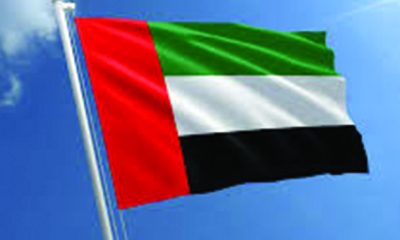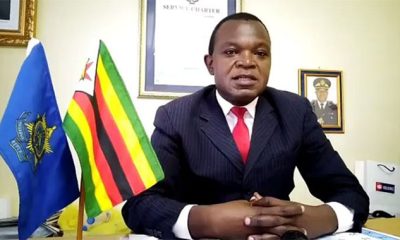FORMER President of Zimbabwe, Cde Robert Gabriel Mugabe died on Friday, September 6, 2019, in Singapore after a long illness. Cde Mugabe affectionately known as Gushungo is remembered as one of Africa’s greatest statesman who contributed immensely in liberating Zimbabwe and encouraging Africa to unite and develop.
Cde Robert Gabriel Mugabe was born on February 21, 1924 at Kutama Mission in Zvimba, a Jesuit Mission Station located 80 kilometres from the capital city, Harare. His late father was Gabriel Matibiri Mugabe, a carpenter by profession and his late mother was Mrs Bona Mugabe (nee’ Shonhiwa) affectionately known as Mbuya Bona. Cde Mugabe’s paternal grandfather was Constantine Karigamombe, who was also known as Matibiri, an overarching, influential figure, who served in King Lobengula’s court in the 19th Century. Cde Mugabe was the third born in a family of six children, two elder brothers, Michael and Raphael, young brother Donato and two sisters, Sabina and Bridgette.
Cde Mugabe received his early education at Kutama Mission which was run by Jesuit missionaries of the Roman Catholic Church and later on by the Marist Brothers. The formative years in a strong Catholic community and his mother’s active involvement as a Catechist for the village children saw him becoming a devout Catholic. Cde Mugabe is remembered by many among his peers during those early days of his school life as an introvert, owing to his pre-occupation with reading books that he would carry with him wherever he went. When he was not in class and it was time to play, he would pass time immersed in books. He was, indeed, a bookworm.
Father O’Hea, a priest in the Catholic Church, took him under his tutorage and became his mentor throughout his youthful days. After completing six years of elementary education, Cde Mugabe was offered a place for teacher training at Kutama College in 1941. Mbuya Bona could not afford the tuition fees, which were paid in part by his grandfather and in part by Father O’Hea.
After graduating as a teacher, Cde Mugabe taught at a number of local schools between 1942 and 1949 before going to South Africa for university education. He studied at Fort Hare University, South Africa, where he graduated with a Bachelor of Arts Degree in 1951 before returning home. While at Fort Hare, Cde Mugabe came in contact with the politics of decolonisation as espoused by South Africa’s African National Congress and other politically conscious students from other countries in the region and beyond.

Cde Robert Mugabe
Upon his return from South Africa, Cde Mugabe’s first job was that of a teacher at Driefontein Roman Catholic Mission School near Mvuma (then Umvuma). Other schools where Cde Mugabe later taught include Mhofu and Mbizi in Highfield, Empandeni Mission, Waddilove Mission and Tegwani.
Cde Mugabe then took his teaching career to Chalimbana Teacher Training College in Zambia from 1955 to 1958 before proceeding to Ghana on a four year contract at St Mary’s Teacher Training College, Takoradi, where he taught at Apowa Secondary School. Before Cde Mugabe could teach in Ghana, he did a local certification course at Achimota School where he met Sarah Francesca Hayfron, whom he would later marry.
While Cde Mugabe was teaching abroad, back home in Southern Rhodesia, an anti-colonialist African nationalist movement was gathering momentum across the country leading to the formation of the Southern Rhodesia African National Congress (SRANC) in September 1957, with Cde Joshua Nkomo taking leadership of the movement. The SRANC was banned by the colonial government in 1959 before being replaced by the United National Democratic Party (UNDP) in January 1960.
Cde Mugabe returned to Southern Rhodesia in May 1960 at the behest of his political colleagues. He brought with him his fiancée, Sarah Francesca Hayfron, affectionately known as Cde Sally. The couple later married in April 1961. Cde Mugabe had planned for their visit to be a short one, but was urged by his African nationalist colleague, Cde Leopold Takawira, to stay.
The exposure to the brutal vagaries of white minority rule that treated Africans as sub-humans and second class citizens in their own country played an instrumental role in driving Cde Mugabe into politics. His political consciousness was further heightened by his stay in the African-ruled Ghana, under Kwame Nkrumah. Following the arrest of Cde Takawira and two other UNDP leaders in July 1960, Cde Mugabe joined a demonstration of about 7 000 people to march from Highfield to the Prime Minister’s office in Salisbury. The demonstration was however, unsuccessful as it was thwarted by the settler regime’s riot police unit outside Stoddart Hall in Mbare. Undeterred, the following day the protesting crowd swelled to about 40 000 people and a makeshift stage and podium were hastily erected for speakers. Cde Mugabe was invited to address the crowd as he had become a respected figure given his academic background, his profession in the education field, his travels abroad and eloquence. This event sowed the seeds of Cde Mugabe’s political metamorphosis from mere consciousness to activism. Consequently, he resigned from his teaching post in Ghana, after having served two years of the four-year teaching contract, to take up active politics.
Under the mentorship of Cde Herbert Chitepo, another Fort Hare alumnus, Cde Mugabe chaired the first UNDP Congress held in October 1960, where he was elected as the Party’s Publicity Secretary. Cde Mugabe immediately got to work and was instrumental in the formation of the UNDP Youth Wing. Cde Mugabe sharpened his oratory and leadership skills by addressing several UNDP rallies before the Party was banned by Smith’s regime in December 1961. Subsequently the fledgling nationalist’s political aspirations led him to join the then Zimbabwe African People’s Union (Zapu) in the same year, where he was appointed as the Party’s Publicity and General Secretary, before ultimately being involved in the formation of the Zimbabwe African National Union (Zanu) in 1963. Both Zanu and Zapu were later officially banned on August 26, 1964. Most leaders of the two political outfits were arrested and detained at various centres with the Zanu leadership confined at Sikombela and then Salisbury Maximum Prisons.
Cde Mugabe was charged with making subversive statements in a public speech while Cde Sally was charged with sedition and sentenced to five years in prison after she led a group of women protesters to the Prime Minister’s Office. She appealed against the sentence and was restricted to her home in Harare until trial. At the same time, Cde Mugabe met with colleagues at his Highfield home where he argued that as political demonstrations were simply being banned and the settler regime was refusing to yield, it was time to move towards armed resistance. He and Cde Sally skipped bail to attend a Zapu meeting in the then Tanganyika (now Tanzania).
In 1964, Cde Mugabe and his wife, Sally, were blessed with a son whom they named Nhamodzenyika. The pregnancy was complicated due to Sally’s high blood pressure condition, lack of proper medical care and political uncertainty then shrouding the struggle.
The Mugabes decided to separate for the sake of their child with Cde Sally taking Nhamodzenyika to her parents in Ghana, while Cde Mugabe returned to Rhodesia where he was arrested and imprisoned upon arrival.
Cde Mugabe was imprisoned between August 1964 until December 1974 for his political activities and opposition to colonial rule. He was first confined at Salisbury Maximum Security Prison, before being moved to Whawha and then to Sikombela. While incarcerated, Cde Mugabe subsequently read for, and earned, more degrees through correspondence. These included a Bachelor of Administration and a Bachelor of Education with the University Of South Africa (Unisa). Other degrees he attained include a Bachelor of Science in Economics, Bachelor of Law and Masters of Law from the University of London. Cde Mugabe not only furthered his studies but also encouraged and assisted his colleagues to further their education through correspondence. These include Comrades Simon Muzenda, Edson Zvobgo, Michael Mawema, Edgar Tekere, Enos Nkala, Moton Malianga, Leopold Takawira, Maurice Nyagumbo, Edison Sithole and Reverend Ndabaningi Sithole, among others.
In December 1966, Nhamodzenyika died of cerebral malaria in Ghana. Cde Sally Mugabe had to endure the agony of their loss alone as the Rhodesian government refused Cde Robert Mugabe permission to attend the funeral of his son.
Upon his release from prison, Cde Mugabe, together with fellow nationalist, Edgar Tekere, were assisted by Father Emmanuel Ribeiro, who was the former’s priest during his time in prison, to escape from the then Rhodesia into Mozambique in March 1975. His main objective was to re-activate the armed liberation struggle and to lead the Zimbabwe African National Liberation Army (Zanla), the armed wing of Zanu, following the assassination of the then Zanu external wing leader, Advocate Herbert Chitepo, by a car bomb in Zambia in 1974. While in Mozambique, Cde Mugabe visited various Zanla camps to build support among the cadres.
By 1976, Cde Mugabe had established himself as the most prominent leader battling the oppressive Smith regime, thereby securing the allegiance and respect of Zanla’s forces. In 1977, Cde Mugabe was formally elected President of Zanu during the Party’s Conference in Chimoio. Before his appointment, he had successfully led the Zanu delegation to the abortive independence talks in Geneva in 1976 and Malta in 1977.
After escalating the armed struggle that left the Smith regime with no option but to negotiate, Cde Mugabe led the Zanu delegation to the Lancaster House Conference in 1979 which ended the 15-year armed struggle paving way for a cease fire. In 1980, on his return to the then Salisbury, Cde Mugabe was greeted by a thunderous crowd at the Zimbabwe Grounds, the biggest crowd ever seen anywhere in the country before then. General elections to formally end British rule were held in the same year bringing majority rule in Zimbabwe, in accordance with the terms set out in the Lancaster House Agreement. The result was a landslide victory for Zanu, which won 57 of the 80 seats. Cde Mugabe became the first Prime Minister of Zimbabwe.
He formed a Government of National Unity in the same year, which drew its members from the major political parties that had participated in the 15-year conflict, including whites. He pronounced a policy of National Reconciliation, itself a master-stroke that helped to build confidence and trust among the warring parties, fostering peace and stability for reconstruction and development in the post-colonial period.

In 1981, Cde Mugabe declared education as a basic human right. This led to the building of an inclusive education system which provided thousands of Zimbabweans who had missed opportunities for education because of the restrictive colonial system and the war. The school system witnessed an increase in primary and secondary schools with the latter rising from 179 to 1 548. As a result of this educational policy, Zimbabwe has one of the highest literacy rates in the world. Between 1982 and 1986, the Government of Zimbabwe, led by Cde Mugabe made great strides in education, health care, infrastructure, agriculture and other social services alleviating lives of the formally marginalised Africans.
In international affairs, Zimbabwe adopted a policy of non-alignment and its foreign policy trajectory was underpinned by the sanctity of the right to life, self-determination, defence of national sovereignty, anti-imperialism, equality of sovereign states and non-interference in the internal affairs of other states. Zimbabwe became a member of the Southern African Development Coordination Conference (SADCC), the Non-Aligned Movement (NAM), the Organisation of African Unity (OAU) and the Commonwealth. In 1983-4 (and again in 1991-2), under the visionary leadership of Cde Mugabe, Zimbabwe assumed one of the non-permanent seats in the United Nations Security Council. In 1986, a NAM summit meeting was held in Harare and the then Prime Minister, Cde Mugabe, became chair of the organisation. Within the same period, as a member of the Front Line states, Zimbabwe strongly campaigned against apartheid and helped launch the African Fund whose main aim was to assist the liberation movements in Namibia and South Africa, the two last bastions of colonialism in Southern Africa.
At home internal disturbances threatened the country’s stability and socio-economic development. However, on December 22, 1987, Cde Mugabe signed the Unity Accord with the PF-Zapu leader, Dr Joshua Nkomo. This resulted in the formation of the united Zimbabwe African National Union-Patriotic Front (Zanu-PF). One week later, Cde Mugabe became Executive President of Zimbabwe with Cdes Joshua Nkomo and Simon Muzenda as his Vice-Presidents.
His exemplary leadership and a high profile foreign policy saw Cde Mugabe winning numerous international accolades such as the 1988 World Freedom against Hunger Award. Cde Mugabe implemented five-year development plans that greatly improved the economy. He was awarded the Africa Prize for leadership for the sustainable end of hunger by the US-Based Hunger Project in 1989. His selflessness and commitment to improve agriculture and education in general saw him using the $100 000 prize money to launch the National Agricultural Scholarship Fund.
In 1991, Zimbabwe hosted the Commonwealth Heads of State Meeting (CHOGM) Summit and Cde Mugabe assumed its chairmanship for the next three years. In 1992, Cde Mugabe’s first wife, Sally, died from a kidney ailment.
In the same year, he assumed chairmanship of the World Frontline States in March and led the Organisation of African Unity (OAU) ad-hoc committee in Angola.
Cde Mugabe was conferred Chairmanship of the World Solar Commission in March 1996, subsequently assuming chairmanship of the G15 in November of the same year.
Cde Mugabe’s four year widower period ended in August 1996 when he wedded Grace Mugabe (née Marufu). The couple was blessed with three children, Bona, Robert Junior and Chatunga Bellermine.
Gliding on the wings of visionary leadership, in June 1997 Zimbabwe hosted the OAU Summit and Cde Mugabe assumed chairmanship of the continental body.
In 2000, Cde Mugabe rolled out the Land Reform Programme in Zimbabwe, whose objective was to address a skewed land tenure system that favoured the white minority. The Land Reform Programme became the only viable option to address the land question, given the restrictions imposed by the Lancaster Constitution and the refusal by the Government of the United Kingdom to honour its promise on the issue. The Land Reform Programme marked the beginning of land redistribution, which saw more than 700 000 landless households being resettled. His championing of an equitable Land Reform Programme is one of major pillars of his legacy. Miffed by his role in the Land Reform programme, Western countries imposed illegal sanctions on him and the country. The sanctions have stifled economic development, creating many challenges for Zimbabwe in the past two decades.
The hung Parliament that came out of the June 2008 elections resulted in talks brokered by the then South African President, Cde Thabo Mbeki, leading to the creation of a Government of National Unity (GNU), comprising representatives from Zanu-PF, the MDC-T led by the late Mr Morgan Tsvangirai and the MDC led by Professor Arthur Mutambara. The GNU, sworn into office in February 2009, demonstrated Cde Mugabe’s visionary leadership by embracing the opposition, as a way of moving the country forward.
The five year-tenure of the GNU ended on July 31, 2013, leading to fresh elections. Cde Mugabe and his Zanu-PF Party won overwhelmingly, resulting in the abandoning of the GNU. In 2014, Cde Mugabe was elected as the Southern African Development Committee (Sadc) Chairperson. The following year, he was elected chairman of the Africa Union (AU). During his tenure as chairman, he advocated for Africa to find own solutions to its problems and for member states to take responsibility in funding the AU. He helped the continent to become more assertive and continued to protect the continent’s resources. He also led the discourse on the industrialisation of the continent and resource nationalism.
Cde Mugabe resigned as President of Zimbabwe on November 21, 2017, after a long and distinguished political career.
Upon hearing the devastating news of the death of his predecessor, His Excellency President Emmerson Dambudzo Mnangagwa cut short a trip to South Africa, where he was attending the World Economic Forum (WEF) summit. President Mnangagwa described Cde Mugabe as “an icon of the liberation [struggle], a pan-Africanist, who dedicated his life to the emancipation and empowerment of his people, (whose) contribution to the history of our nation and continent will never be forgotten.”

President Mnangagwa
Conferring national hero status on Cde Mugabe, President Emmerson Mnangagwa said:
“Zanu-PF, the Party, which the late departed helped found has met and accorded him National Hero status, which he earned and richly deserves. We, as Zimbabweans declare days of mourning for our leader until he is buried. On behalf of our nation, that of my family and on my own behalf, I wish to express my deepest, heartfelt condolences to the Mugabe family, to Amai Grace Mugabe and the children especially, on their saddest loss. Amai Mugabe stood by her husband to the very end, thus imparting to our nation a lasting lesson on devout love and care. For that, we deeply thank her as we join her in the grief of loss and bereavement, which is also ours to feel and bear.”
Following the passing on of the former President Cde Robert Gabriel Mugabe, world leaders joined the nation in mourning the passing on of the iconic founding father of Zimbabwe. The following are snippets of what some of the world leaders said:
South African President Cyril Ramaphosa said: “South Africans join the people and government of Zimbabwe in mourning the passing of a liberation fighter and champion of Africa’s cause against colonialism that inspired our own struggle against apartheid and built in us the hope that one day South Africa too would be free. We will never forget, or dishonour this sacrifice and solidarity.”
Kenyan President Uhuru Kenyatta said: “In this moment of sorrow, my thoughts and prayers go out to his family, his relatives and the people of Zimbabwe who, for many years, he served with commitment and dedication. Words cannot convey the magnitude of the loss as former President Mugabe was an elder statesman, a freedom fighter and a Pan-Africanist, who played a major role in shaping the interests of the African continent. Indeed, we will remember former President Mugabe as a man of courage who was never afraid to fight for what he believed in, even when it was not popular.”
Tanzanian President John Magufuli: “Africa has lost one of its bravest and Pan-Africanist leaders, who led by example in opposing colonialism.”
Namibian President Hage Geingob: “As Namibians, we owe President Mugabe a deep sense of gratitude for his immense and selfless contributions to the liberation of our country. The loss of the people of Zimbabwe is Africa’s loss.”
Nigerian President Muhammadu Buhari: “The President commiserates with family members, friends and political associates of the political activist who fought for the independence of the country from colonial rule and lived most of his life in public service. Mugabe’s sacrifices, especially in struggling for the political and economic emancipation of his people, will always be remembered by posterity.”
China’s foreign ministry: “Mugabe was an outstanding national liberation movement leader and politician of Zimbabwe. Throughout his life, he has firmly defended the sovereignty of his country, opposed foreign interference, and actively promoted China-Zimbabwe and China- Africa friendship and cooperation.”
Russian President Vladimir Putin: “Many important events in contemporary history of Zimbabwe are linked with the name of Robert Mugabe. He made a major personal contribution to the struggle for your country’s independence and to building institutions of Zimbabwean statehood. The people of Russia will remember him as a consistent advocate of developing friendly relations between our countries and a person who had accomplished a great deal to strengthen mutually beneficial bilateral cooperation.”
During his long and illustrious political career, Cde Mugabe successfully attained several academic achievements, was awarded various honorary awards and an assortment of local, regional and international accolades as outlined below:
Academic Credentials:
Bachelor of Arts (History and English) (BA) Degree (Fort Hare)
Bachelor of Education Degree (B.Ed) from the University of South Africa (Unisa)
Bachelor of Administration Degree (B.Admin) from University of South Africa (Unisa)
Bachelor of Science Economics from University of London Programme) (External Programme)
Bachelor of Laws Degree (LLB) from London Programme) University (External Programme)
Master of Science Economics Degree (MSc) in Economics from University of London (External Programme)
Master of Laws Degree (LLM) from London Programme) University (External Programme)
Honorary Awards
Honorary LLD Degree from Ahmadou Bello University (Nigeria)
Honorary LLD Degree from Morehouse College (Atlanta, Georgia)
Honorary LLD Degree from University of Zimbabwe (Zimbabwe)
Honorary LLD Degree from St. Augustine’s University (Tanzania)
Honorary LLD Degree from Lomonosov Moscow State University (Russia)
Honorary LLD Degree from Solusi (Zimbabwe) University
Honorary D.Lit Degree from Africa University (Zimbabwe)
Honorary D.Lit Degree from University of Mauritius (Mauritius)
Honorary D. Comm. Degree from Fort Hare University (South Africa)
Honorary D. Tech. Degree from National University of Science and Technology (Zimbabwe)
Honorary D.Phil (African Heritage and Philosophy) degree from Great Zimbabwe University (Zimbabwe)
Honorary Professorship Cert. from the Chinese Foreign Affairs University
International Accolades:
Hosted and elected Chairman of the Non- Aligned Movement (NAM) in September, 1986.
Awarded Africa Prize for Leadership for Sustainable End of Hunger on 15th September, 1988, by the US-based Hunger project.
Used US$100 000 prize money to launch a National Agriculture Scholarship Fund.
Received the Jawaharlal Nehru Award 1989
Hosted the Commonwealth 1991 Summit and assumed Chairmanship of CHOGM for the next three years
Assumed Chairmanship of the Frontline States in March 1992 and also led the OAU Ad-HOC committee on Angola
Conferred of the Commission Chairmanship World Solar March 1996. The Commission seeks use of eco-friendly energy sources.
Awarded the Olympic Order of Gold for his eminent contribution to the Olympic ideals, September 1995.
Assumed Chairmanship of the G15 group of countries, November 1995.
Elected first Chairman of SADC organ on Defence, Politics and Security, June 1996.
Hosted the World Solar Summit, September 1996.
Awarded the Order of Jamaica, September 1996.
Assumed Chairmanship of OAU, June 1997.
Chairman Southern African Development Community (Sadc) from August 2014 to August 2015.
13th Chairperson of the African Union (AU) from January 2015 to February 2016.
Cde RG Mugabe is the number 149 National Hero of Zimbabwe. A two day body viewing ceremony was held at Rufaro Stadium as part of the funeral procession, with thousands bidding farewell to their liberation and post-independence political icon. World leaders had the opportunity to pay their last respects at the National Sports Stadium, an event that received World Wide media coverage.
He was laid to rest at his Kutama village homestead.
He is survived by wife Grace; three children, Bona Nyepudzai, Robert Junior and Chatunga Bellermine and two grandchildren.
Taken from A Guide to the Heroes Acre



















